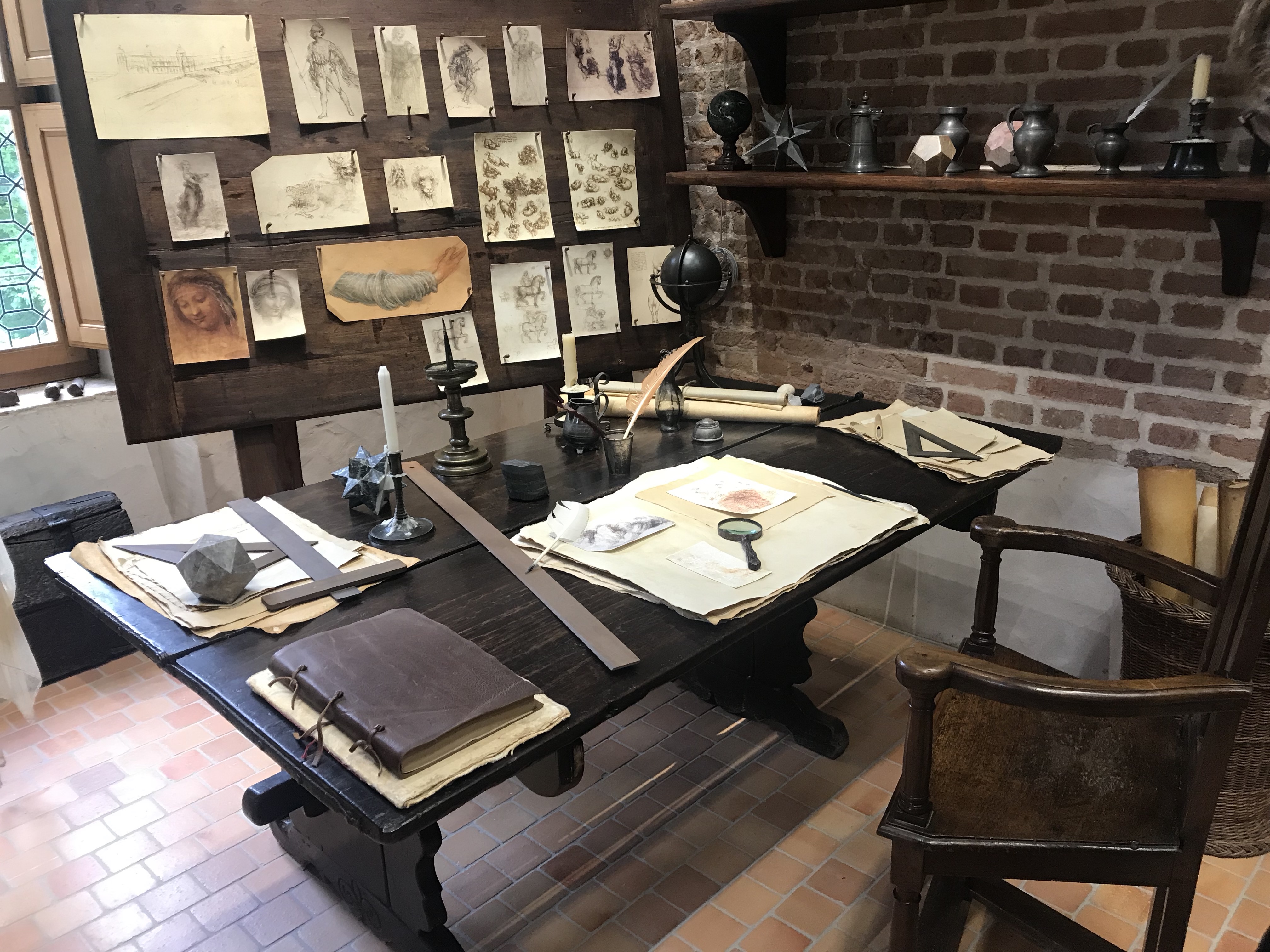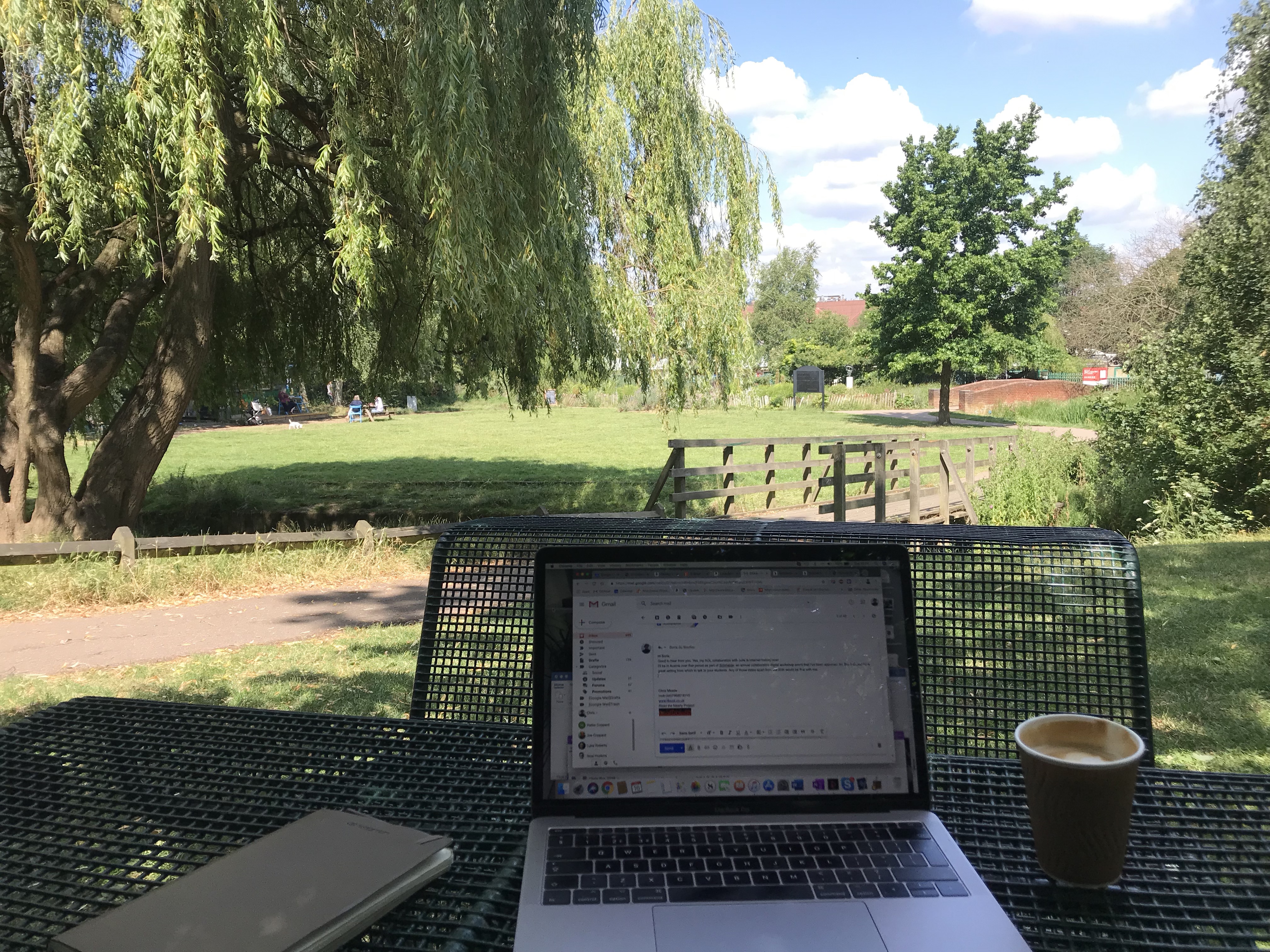Our first stop in the campervan this summer was, by chance, at the Chateau du Clos Luce in the Loire Valley. It was raining and cold and we needed a break. This building was Leonardo da Vinci’s last home, a space provided by the French King François which Leo came to in his mid-sixties with his belongings, including the Mona Lisa, packed in leather bags carried on a donkey. It’s compact for a royal chateau, with plenty of natural daylight and a beautiful garden. His bedroom, studio, study, chapel, dining room and kitchens are all close to each other. The chapel is small, like a spiritual larder, simple but decorated with frescoes by his students. It was built for a queen so she could mourn her children who died in infancy and where she “came to shed the most painful tears a woman can weep”. In the kitchen sits a wooden Gossip’s Chair where Leo, a vegetarian, used to sit and chat to his cook, a good friend to whom he left some of his favourite clothes.
Leonardo spent his time in these surroundings pottering, in other words filling notebooks with designs for flying machines, a clockwork tank and car, ball bearing and three speed gear mechanisms. On his deathbed he is said to have wept and declared he’d failed God and the people of the world by not working at his art as he should have. But it’s a fulfilling place where a man had all he needed including solitude and space for visitors, books, paints, inks, a collection of bits like a skull, shells, geometric objects, pendulums, little notebooks beautifully bound.
We looked around the house, walked in the rain through his garden, ate omelettes in the creperie and carried on driving.

Now we’re in a campsite near Salamanca, the very beautiful Spanish renaissance university city. I first came to this place over a decade ago to give a talk to a literacy foundation, I was no doubt looking nervously at my notes on the flight to Madrid and did the same on the train, checked into an ordinary hotel, slept and then the next morning, having a couple of hours to kill before giving my presentation, I stepped out into the gobsmackingly miraculous grandeur of Plaza Major, a huge, elegant square of golden stone cloisters, a serried row of shuttered apartments above, at each corner a street cafe, all forms of human conversation and perambulation taking place across the space.
This time we’ve come here on holiday, I’ve told Hattie how special it is for me, we cycle in along the river from the campsite, buy a guidebook, then follow in the footsteps of umpteen groups of bored teenagers being told the names of saints and painters they don’t give a toss about. It’s still beautiful, but another kind of experience entirely. As a tourist I am defined as a flippant outsider, not a genuine contributor to the life of the town.
For my book group, a monthly gathering of male friend who are all over sixty now, I’ve just read The Argonauts by Maggie Nelson. This astoundingly brilliant book puts next to each other two similar but different experiences. First is the author’s pregnancy. Nelson finds her body changing dramatically and disconcertingly; this feminist campaigner is confronted by the challenge of being seen as having entered a state of essential femaleness. Second is her partner’s experience as a trans male receiving injections of testosterone and undergoing surgery to have breasts removed. Both events involve extreme physical sensations and emotional and hormonal transformations, but one is cooed over by society as a wondrous miracle of nature, the other condemned by many as a transgressive undoing of all that is deemed natural.

As I grow older I know my body feels different from inside and looks different from without. I’m also noticing how in the parlance of Queer Studies, people my age and beyond become othered as those in the midst of life start to ignore us or despise us or, even worse, applaud us for being ‘amazing at that age’ for doing whatever it is we choose to do. It’s a shock, especially for those white, male, middle class heterosexuals who are so used to being at the centre of the action.
For better or worse it is still possible for a few men over sixty to become leaders of the free world or corporations or political parties. For most of us the career doors creak gradually to a close or slam suddenly shut as we head towards old age. Some can choose to take up biking or running to remain fit for longer – or in my case choose not to – but all bodies will eventually lose their strength and vitality. Older brains can be sharp, creative and retentive, with added quirkiness. As anti-ageist activist Ashton Applewhite writes: “even as the population ages, dementia rates are dropping. The real epidemic is anxiety about memory loss. Remember the 2.5 per cent of people over 65 living in nursing homes? Ninety per cent of the remainder can think just fine”. At 63 I have senior moments of forgetfulness, but to be honest I’ve had similar junior moments all my life. I’m not sure that I feel less sexual in my sixties, but the elements of what I’d call my sexuality – attraction, desire, fantasy, memory, physical responses to stimuli – all have separate existences now, are each islands in a bigger sea of drives and feelings. And what does it mean to be male when you’re not spending so much time kitted out in established gendered roles as dad or husband, boyfriend, boss or worker?
In retirement some men turn into sad shadows of themselves, still filled with the pomposity of their bossiness or the lechery of spent predation, boring us with expertise about what doesn’t matter so much now, flirting with sparkling eyes that no longer ignite. Without wages to slave for, businesses to run, power to abuse, what are men?
Perhaps at last we can be simply, fully, human beings. Older men are left with the freedom to be who they really want to be, unnoticed by a youth-normative world which seems extraordinarily capable of forgetting that whether or not we change gender or social class or sexual preference, we all grow old.
Older men have been othered. Which means we can stop being any version of ‘real men’ and become plain people. And if not now, when?
“To align oneself with the real while intimating that others are at play, approximate or in imitation can feel good. But any fixed claim on realness, especially when it is tied to an identity, also has a finger in psychosis. If a man who thinks he is a king is mad, a king who thinks he is a king is no less so”. (Nelson, p. 17).
If the process of pregnancy can be thought of as queer, then the process of ageing certainly is. Like being pregnant, growing older “profoundly alters one’s ‘normal’ state and occasions a radical intimacy with – and radical alienation from – one’s own body.”
Last year I suffered a few days of pain in one foot. Planning in advance how to hike from one chair to another, one room became a challenging terrain I could only traverse with a strange hobbling dance. It hurt like hell, but led me to find new moves for constricted space.
Instead of clinging onto habitual ideas of what it is to be, let’s do what Nelson advocates for all the othered and “radically recontextualise and rethink kinship networks”, explore afresh how we want to be with our friends, families, partners, with our memories and our imaginings in relation to what’s here, what never really was, what’s gone and what we’ll never live to see. Let’s test the new choreography of our bodies in lesser movement, the impressionistic blurring of our vision, the minimal music of our tinnitus, the sensations of ache and rest, the cartography of new wrinkles and swellings, the immersive fiction of our memories.

I’m back at home now and our house seems huge and static after the portable simplicity of the van. A whole room just to sleep in – but the same view outside the window every morning? I think about Leonardo’s chateau. What would I bring on the donkey? Which objects and spaces, relationships and activities give my life most meaning and pleasure? Together can we othered elders find inventive ways to hang onto the essentials of what matters most to us as horizons shrink and circumstances change?

